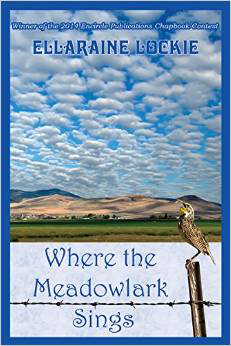Comment on this
article
Where the Meadowlark Sings
by Ellaraine Lockie
Encircle Publications, 2015
ISBN-10: 1893035239
Reviewed by Julie Demoff-Larson

Dear Ellaraine,
Here, in the middle of urban metropolis commercialism, where I have spent most of my living and will remain for some time, there seems to be an alter ego with a bullhorn in my head trying to lead me to a simpler, quieter place. Maybe it’s the traffic, or the five feet from the neighbors, or the go, go, go living. Whatever the reason, I can’t help but think one day I will head down country roads—where I belong—and become that mountain momma, where open spaces and 360 degree scenery and fresh air will surely inspire. Yes—I believe the grass is probably greener and the air fresher. So when I read your chapbook Where the Meadowlark Sings, I was taken with your images, memories, and history of rural life. Montana, a place where we city dwellers dream about, yet you were so aware that the grass would be greener for you elsewhere. Because in rural splendor there are greater hardships and ideologies than I could ever perceive.
You begin Where the Meadowlark Sings with “Abandoned Garden,” speaking for the women who first set up homesteads:
“A pioneer woman’s attempt to civilize an untamed land
As though she were out gathering a bouquet
for a quilting bee in her homestead house
when some tragedy befell her”
Her life was much harder back then, but you remind us that
“she lingers in these immigrant flowers
that survive encroachment from native clover
blue flax, sage and morning glory
Butterflies that pollinate from one to the other
arbitrating the struggle
Like the diplomacy of a woman
caught between a hardcore German husband
and the America around them”
Do we take these beginnings for granted? Not so much, because we continue to plant and cultivate, taking care to root ideas and foster independence for our mothers, sisters, daughters and sons. And after all not so much has changed when the idea that a woman’s joy is found in the company of a man still comes up. Well, you set them straight Ellaraine. “After Montana” is an eloquent post-visit rebuttal that shows the depth and complexities of a women’s soul.
“The guys in the California coffee shop
say I look like I’ve been with a new lover
I could tell them how wind
slides over skin like a feather duster
How the silk of knee-deep grass strokes bare legs
The face tickle of a spider strand on a sigh of air
That wears the pale perfume
of yellow prairie clover in full bloom
And hollyhocks stand higher and straighter
than any man you have been with”
Here, you pick me up and place me in your world that becomes so familiar to me. I am nostalgic for a place I never been—homesick. The natural world is our playground and boy, can you play. Twisting and manipulating language that makes this poem more sensual than the fantasies or “whatever tall tales/men tell each other in coffee shops.” But we are forgiving, and like you allude to in “If Women Ran the World,” we are compassionate and pragmatic. We know how to warm a heart, to get the job done. Maybe that is in our genetic makeup, or maybe it is one of those seeds sown by mothers and grandmothers.
You address the backward thinking that still plagues the American heartland, Southern tradition, and our urban centers with those invisible lines that keep class, color, and crime from walking on green manicured lawns. “Facing Family Tradition” could be my memory too. The Brazil nut—a childhood holiday tradition of nut cracking and the informing of “nigger toes.”
“But another narrator
holds the hostage in midair
Letters in the words nigger toes
stand as bone-hard as the shell
that once surrounded the meat
Encircling the nut like a family who gathered
around an oak table cracking nuts
on winter evenings before television and civil rights”
Ellaraine, your collection may only host 24 poems but each has made such an impact. Beauty, struggle, duty, admiration, and strength in your work embody all that I want and all that I don’t want. Where the Meadowlark Sings will stay with me. It will be a pull-off-the-shelf-and-read-again text, a you have to read this, a this reminds me of an Ellaraine Lockie poem kind of text. Thank you.
Sincerely and my best,
Julie Demoff-Larson
First published: Blotterature Literary Magazine
Return to:
|


